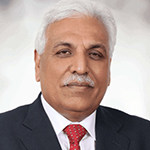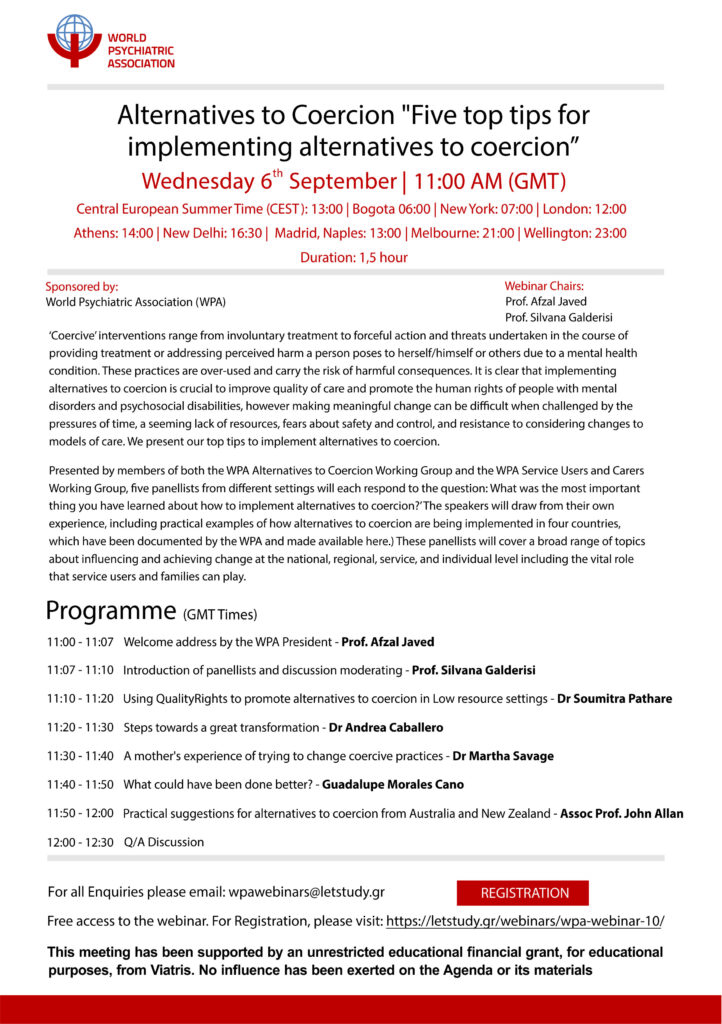FREE Webinar:
Alternatives to Coercion "Five top tips for implementing alternatives to coercion"
September 6th, 2023
Wednesday
11:00 AM GMT
(Duration 1,5 hour)
Free
Registration is required
Certification
To all attendants via email
Alternatives to Coercion “Five top tips for implementing alternatives to coercion”
September 6th, 2023 at 11:00 AM GMT
CEST
13:00
Bogota
06:00
New York
07:00
London
12:00
Athens
14:00
New Delhi
16:30
Madrid, Naples
13:00
Melbourne
21:00
Wellington
23:00
Have you ever wanted to change your practice or service so that it can better avoid using coercive measures such as seclusion and restraint?
This webinar may help you.
‘Coercive’ interventions range from involuntary treatment to forceful action and threats undertaken in the course of providing treatment or addressing perceived harm a person poses to herself/himself or others due to a mental health condition. These practices are over-used and carry the risk of harmful consequences. It is clear that implementing alternatives to coercion is crucial to improve quality of care and promote the human rights of people with mental disorders and psychosocial disabilities, however making meaningful change can be difficult when challenged by the pressures of time, a seeming lack of resources, fears about safety and control, and resistance to considering changes to models of care.
We present our top tips to implement alternatives to coercion.
Presented by members of both the WPA Alternatives to Coercion Working Group and the WPA Service Users and Carers Working Group, five panellists from different settings will each respond to the question: What was the most important thing you have learned about how to implement alternatives to coercion?’ The speakers will draw from their own experience, including practical examples of how alternatives to coercion are being implemented in four countries, which have been documented by the WPA and made available here.) These panellists will cover a broad range of topics about influencing and achieving change at the national, regional, service, and individual level including the vital role that service users and families can play.
CHAIRS

Afzal Javed, MD
Chair
President World Psychiatric Association (WPA)
Consultant Psychiatrist (UK and Pakistan)
Honorary Professor. Institute of Applied Health Research, University of Birmingham, UK
Honorary Clinical Associate Professor, Warwick Medical School, University of Warwick, UK
Chairman Pakistan Psychiatric Research Centre, Fountain House, Lahore, Pakistan.

Prof. Silvana Galderisi
Co-Chair
Silvana Galderisi, MD, PhD, is full professor of Psychiatry, Director of the Emergency Unit of the Department of Mental Health of the University of Campania Luigi Vanvitelli; Coordinator of the Outpatient Unit for Anxiety and Psychotic Disorders and of the Rehabilitation Program for severe mental disorders of the same Department.
She is Chairperson and founding member of the European Group for Research in Schizophrenia (EGRIS), President of the Italian Society for Psychopathology, Past President of the European Psychiatric Association, Chairperson of the Standing Committee on Ethics of the World Psychiatric Association (WPA), and Co-chair of the WPA Working Group “Implementing alternatives to coercion in Mental Health Care”.
She is board member of the European Scientific Association on Schizophrenia and other Psychoses and of the Italian Society of Biological Psychiatry. She is Honorary Member of the European Psychiatric Association-EPA, Honorary Fellow of the World Psychiatric Association-WPA, Honorary Member of the Polish Psychiatric Association and of the Hungarian Psychiatric Association, International Distinguished Fellow of the American Psychiatric Association, International Advisor of the Japanese Society of Psychiatry and Neurology, and Honorary Fellow of the European Society of Social Psychiatry.
Her research activity focuses on Schizophrenia pathophysiology, treatment and outcomes, with particular reference to the domains of negative symptoms and cognition and their impact on psychosocial outcomes. She is an author/coauthor of more than 400 publications, in national and international journals and books, and a member of the Editorial Boards of several international psychiatric journals. She is Editor in Chief of Schizophrenia Bulletin Open, and handling editor of the British Journal of Psychiatry Open.
Prof. Galderisi has been awarded the “2023 EPA Constance Pascal – Helen Boyle Prize for Outstanding Achievement by a Woman in Working to Improve Mental Health Care in Europe”.
panellists

Dr Soumitra Pathare
Using QualityRights to promote alternatives to coercion in Low resource settings
Dr Soumitra Pathare MD MRCPsych PhD is a Consultant Psychiatrist and Director of Centre for Mental Health Law and Policy at the Indian Law Society, Pune, India. His primary interests are in the areas of mental health policy, scaling up mental health services, rights-based care and legislation.
He assisted the Government of India in drafting India’s new rights-based Mental Health Care Act 2017, and India’s first National Mental Health Policy released in October 2014.
He has served as a WHO consultant in many low and middle-income countries (Botswana, Seychelles, Lesotho, Samoa, Vanuatu, Eritrea) assisting them with mental health legislation and policy.
He was the Principal Investigator of QualityRights Gujarat project (2014-2016) which implemented the WHO QualityRights program in 6 public mental health facilities in Gujarat.
He is currently involved in scaling up Atmiyata across Mehsana district, Gujarat with a population of 1 million to improve access to mental health services in rural areas, by training and mentoring women leaders of micro-credit self-help groups.
He is Project Director of SPIRIT Hub (2017-2022) a collaborative initiative of Centre for Mental Health Law and Policy ILS (Pune), TRIMBOS (Netherlands), SNEHA (Chennai) and BCCP (Bangladesh) with the Department of Health and Family Welfare, Government of Gujarat funded by NIMH (USA). SPIRIT is scaling up and evaluating 3 universal suicide prevention interventions.

Dr Andrea Caballero
Steps towards a great transformation
Andrea Caballero is a Psychiatrist and Bioethicist.
Since 2018 she is the Scientific Director of Campo Abierto, a psychiatric clinic in Bogotá, Colombia. Since then, she has worked with her team on two policies that are fundamental to the model of care they offer to hospitalized patients: i) the policy of non-coercion with different strategies and ii) the policy of humanization of the service by facilitating the entry of the humanities, offering classes in different art disciplines (music, illustration, creative writing, and dance/movement) to people in crisis.

Dr Martha Savage
A mother’s experience of trying to change coercive practices Born in the United States, Martha Kane Savage is also a New Zealand citizen, and is Professor of Geophysics at Victoria University of Wellington. In 2017 her son died in a Japanese hospital after being mechanically restrained for 10 days, and she has since campaigned for an end to the practice. She is an Honorary member of the WPA and is serving on the Working Group on Developing Partnerships with Service Users and Family Carers, on the WPA Working Group Implementing Alternatives to Coercion in Mental Health Care, and on the Working Group on WPA Volunteering.

Guadalupe Morales Cano
What could have been done better?
Guadalupe Morales Cano, is a Journalist and director of Fundación Mundo Bipolar (Spain), Commissioner of Lancet Commission on Stigma and Discrimination in Mental Health, and Representative of persons with lived experience at the Spanish Mental Health Strategy.
Mrs Morales had teaching positions at universities in Spain and USA. Currently she teaches in the Master of Universitat Jaume I, in Valencia, Spain”, at Universidade NOVA Lisbon, International Learning Program and at The International Diploma in Mental Health, Human Rights, and Law in Pune, India, promoted by WHO. She is an Honorary Member of WPA, and Vice president of ENUSP - European Network of (-Ex) Users and Survivors of Psychiatry. Her main interests are: raising of the voice of people with mental health problems, at a political level, to have a meaningful involvement in every aspect related to this collective and to promote their Rights, developing projects on peer2peer trainings and to professionals.

Associate Prof. John Allan
Practical suggestions for alternatives to coercion from Australia and New Zealand President of the Royal Australian and New Zealand College of Psychiatrists (RANZCP) until May2021. Executive Director of Mental Health Alcohol and other Drugs Branch, Clinical Excellence Division in Queensland Health School of Medicine University of Queensland, Australia. Associate Professor Allan leads the Mental Health, Alcohol and other Drugs Branch in Queensland Health, which is the key agency for policy, service development, clinical and legislative governance and information management. He has previously been Chief Psychiatrist in both Queensland and New South Wales. He spent twenty years working in North Queensland where he helped a community recover from a traumatic psychiatric scandal, led clinical services and developed a wide range of new mental health services. He is highly experienced in government policy, mental health legislation and service development.




